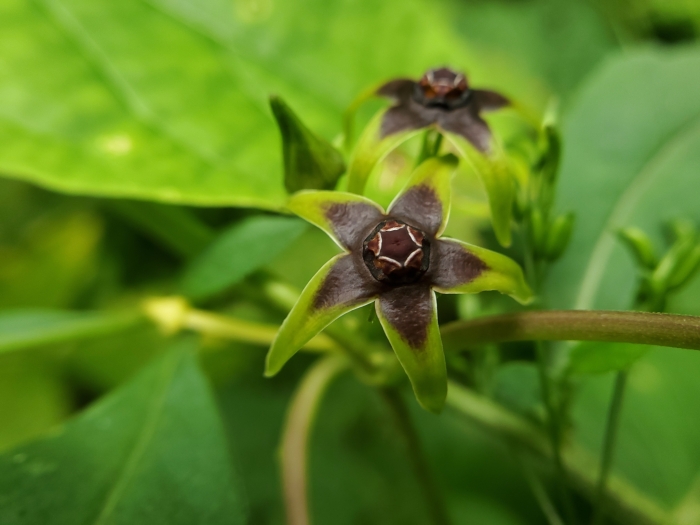Angularfruit Milkvine
(Gonolobus suberosus)
Angularfruit Milkvine (Gonolobus suberosus)
/
/

Will Kuhn
CC BY 4.0
Image By:
Will Kuhn
Recorded By:
Copyright:
CC BY 4.0
Copyright Notice:
Photo by: Will Kuhn | License Type: CC BY 4.0 | License URL: http://creativecommons.org/licenses/by/4.0/ | Rights Holder: Will Kuhn | Publisher: iNaturalist | Date Created: 2021-07-19T14:36:19-07:00 |


















































Estimated Native Range
Summary
Gonolobus suberosus, commonly known as Angularfruit Milkvine, is a deciduous perennial vine native to a variety of habitats including open woodlands, forest edges, and thickets in the Southeastern USA. It can climb to heights of 3-10 feet (0.9-3 meters) with a relatively narrow spread of about 0.4 feet (0.1 meters). This vine is characterized by its twining habit and corky, warty bark. The flowers, which appear in the summer, are small and typically have a complex structure with red, yellow, and green hues, though they are not particularly showy. The plant is most notable for its angular, inflated seed pods that develop after flowering.
Angularfruit Milkvine is valued for its ability to attract pollinators, including butterflies, and serves as a host plant for various species of milkweed butterflies. It is used in naturalistic plantings, wildlife gardens, and as a climbing vine in residential landscapes. It prefers full sun to part shade and requires medium amounts of water with well-drained soil. While it is not known for major diseases or pests, it can be sensitive to overly wet conditions which may lead to root rot. This vine is not typically aggressive or invasive, but gardeners should be aware of its twining growth and provide appropriate support structures.CC BY-SA 4.0
Angularfruit Milkvine is valued for its ability to attract pollinators, including butterflies, and serves as a host plant for various species of milkweed butterflies. It is used in naturalistic plantings, wildlife gardens, and as a climbing vine in residential landscapes. It prefers full sun to part shade and requires medium amounts of water with well-drained soil. While it is not known for major diseases or pests, it can be sensitive to overly wet conditions which may lead to root rot. This vine is not typically aggressive or invasive, but gardeners should be aware of its twining growth and provide appropriate support structures.CC BY-SA 4.0
Plant Description
- Plant Type: Herb, Vine
- Height: 3-1 feet
- Width: 3-1 feet
- Growth Rate: Moderate
- Flower Color: Purple, Green
- Flowering Season: Summer
- Leaf Retention: Deciduous
Growth Requirements
- Sun: Full Sun, Part Shade
- Water: Medium
- Drainage: Fast
Common Uses
Bird Garden, Butterfly Garden
Natural Habitat
Open woodlands, forest edges, and thickets
Other Names
Common Names: Anglepod
Scientific Names: , Matelea gonocarpa, Gonolobus suberosus, Gonolobus suberosus var. suberosus, Gonolobus suberosus var. granulatus, Matelea suberosa, Cynanchum suberosum, Gonolobus granulatus, Vincetoxicum suberosum, Gonolobus gonocarpus
GBIF Accepted Name: Gonolobus suberosus (L.) Schult.